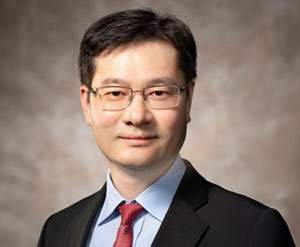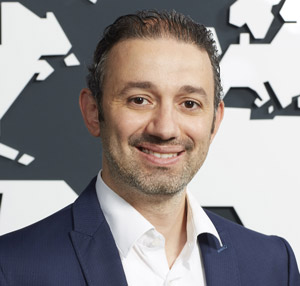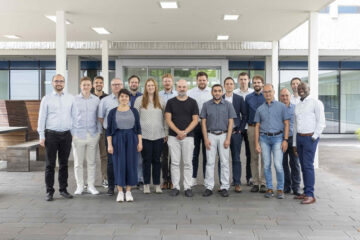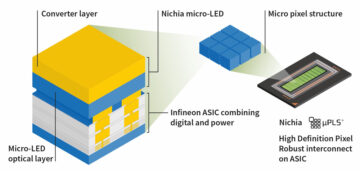News: Microelectronics
2 February 2024
The National Science Foundation (NSF) has given a $300,000 grant to Xiaoqing Song, an assistant professor in the University of Arkansas‘ Electrical Engineering and Computer Science Department, to support his research project focused on advancing high-density and high-operation-temperature traction inverters. His project explores the integration of gallium oxide ( Ga2O3) packaged power modules to enhance the power density and temperature range of electric vehicles (EVs).
Collaborating with the National Renewable Energy Laboratory (NREL), the project aims to innovate power module packaging, establish reliable strategies for Ga2O3 power devices and demonstrate the capabilities of a high-density, high-temperature traction inverter.
“By eliminating technical barriers for gallium oxide device integration, this project will foster the development of next-generation, high-density and high-operation-temperature power converters,” says Song.

Picture: Xiaoqing Song, assistant professor of electrical engineering and computer science at the University of Arkansas.
Responsible for converting stored direct current (DC) power into alternating current (AC) power to drive electric motors, the traction inverter stands to benefit significantly from Ga2O3 technology. “Gallium oxide can make the traction inverter smaller, lighter, more efficient and capable of operating across a wider range of temperatures,” notes Song. “Gallium oxide has a larger bandgap energy compared to conventional silicon and wide-bandgap semiconductors. It enables high breakdown electrical strength, low intrinsic carrier concentration and correspondingly high operation temperatures,” he adds.
One challenge addressed in the project is the low thermal conductivity of Ga2O3, which hinders efficient heat removal. Song outlines the plan to develop advanced power module packaging techniques that enable low thermal resistance, low parasitic inductances and high-temperature operation capability.
“NREL has significant experience in power module simulation, fabrication and characterization, as well as world-class experimental and lab capabilities for evaluating and designing efficient and reliable power electronics systems,” says Song. “The principal investigator [PI] will collaborate with them to design and develop a Ga2O3-based high-density and operation-temperature traction inverter for automotive applications,” he adds. “This project will help establish a long-term partnership with NREL that can catalyze further research and development of ultra-wide-bandgap power semiconductor devices.”
The collaboration with the NREL aims to design and develop a Ga2O3-based high-density and high-operation-temperature traction inverter for automotive applications, fostering a long-term partnership that can drive further research in ultra-wide-bandgap power semiconductor devices. “Other applications include power grids, data centers, renewable energy, space and defense, etc,” Song says.
The success of the project, he believes, will provide valuable insights into Ga2O3 device modeling, packaging, gate driving, protection and application in power converters. This is expected to catalyze progress in transport electrification and the deployment of Ga2O3 technology in challenging environments.
“The research achievements and experiences gained in the fellowship will sustain and promote the PI’s future multi-disciplinary research activities in semiconductor devices, multi-physics analysis, power module packaging and high-performance power electronics,” Song says.
“Other broader impacts also include the education and development of the next-generation workforce in STEM (science, technology, engineering and math), the encouragement of more women and under-represented minorities in electrical engineering, especially in the area of wide- and ultra-wide-bandgap semiconductor devices, power module packaging and power electronics with hands-on lab experiences.”
University of Arkansas Gallium Oxide
- SEO Powered Content & PR Distribution. Get Amplified Today.
- PlatoData.Network Vertical Generative Ai. Empower Yourself. Access Here.
- PlatoAiStream. Web3 Intelligence. Knowledge Amplified. Access Here.
- PlatoESG. Carbon, CleanTech, Energy, Environment, Solar, Waste Management. Access Here.
- PlatoHealth. Biotech and Clinical Trials Intelligence. Access Here.
- Source: https://www.semiconductor-today.com/news_items/2024/feb/arkansas-020224.shtml
- :has
- :is
- 000
- a
- AC
- achievements
- across
- activities
- addressed
- Adds
- advanced
- advancing
- aims
- also
- an
- analysis
- and
- Application
- applications
- AREA
- arkansas
- AS
- Assistant
- At
- automotive
- barriers
- believes
- benefit
- Breakdown
- broader
- CAN
- capabilities
- capability
- capable
- catalyze
- Centers
- challenge
- challenging
- collaborate
- collaboration
- compared
- computer
- computer science
- concentration
- conductivity
- conventional
- converting
- Current
- current (DC)
- data
- data centers
- dc
- Defense
- demonstrate
- density
- Department
- deployment
- Design
- designing
- develop
- Development
- device
- Devices
- direct
- drive
- driving
- Education
- efficient
- Electric
- electric vehicles
- electrical engineering
- electrification
- Electronics
- eliminating
- enable
- enables
- energy
- Engineering
- enhance
- environments
- especially
- establish
- etc
- EV
- evaluating
- evs
- expected
- experience
- Experiences
- experimental
- explores
- February
- focused
- For
- Foster
- fostering
- Foundation
- from
- further
- future
- gained
- gate
- given
- grant
- hands-on
- he
- help
- High
- high-performance
- hinders
- his
- HTTPS
- Impacts
- in
- include
- innovate
- insights
- integration
- into
- intrinsic
- IT
- jpg
- lab
- laboratory
- larger
- lighter
- long-term
- Low
- make
- math
- minorities
- modeling
- module
- Modules
- more
- more efficient
- Motors
- multi-disciplinary
- National
- next-generation
- Notes
- NSF
- of
- on
- operating
- operation
- outlines
- packaged
- packaging
- Partnership
- plan
- plato
- Plato Data Intelligence
- PlatoData
- power
- Principal
- Professor
- Progress
- project
- promote
- protection
- provide
- range
- receives
- reliable
- removal
- Renewable
- renewable energy
- research
- research and development
- Resistance
- says
- Science
- Science Foundation
- semiconductor
- Semiconductors
- significant
- significantly
- Silicon
- simulation
- smaller
- song
- Space
- stands
- Stem
- stored
- strategies
- strength
- success
- support
- Systems
- Technical
- techniques
- Technology
- that
- The
- The Area
- Them
- thermal
- this
- to
- traction
- transport
- university
- Valuable
- Vehicles
- WELL
- which
- wider
- will
- with
- Women
- Workforce
- world-class
- zephyrnet









